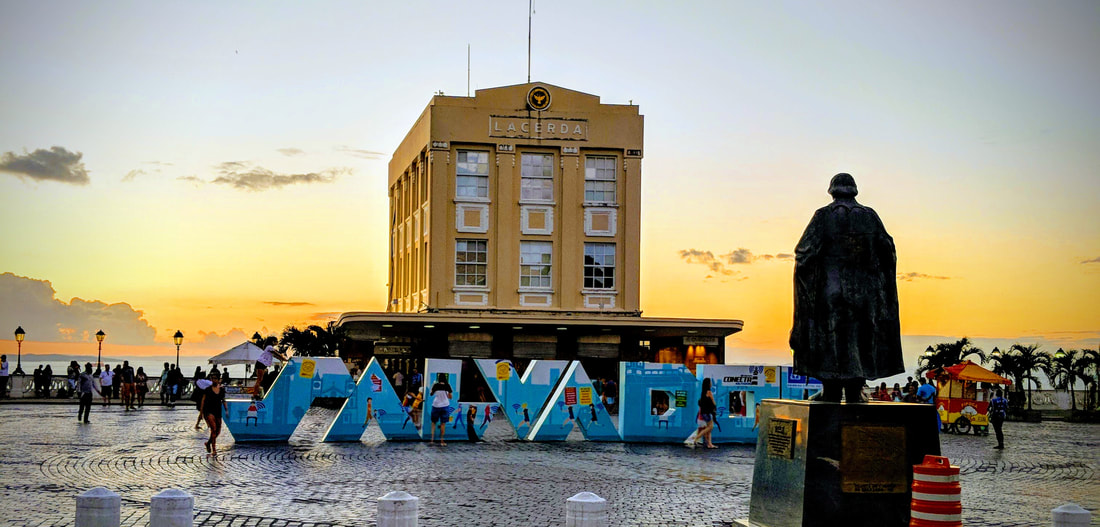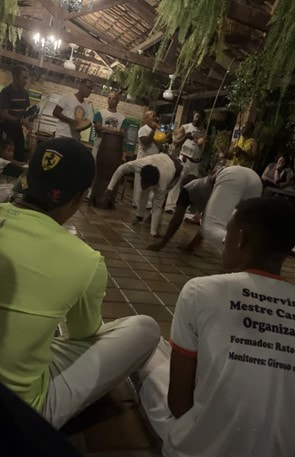|
By Kathryn McDonough In our class before coming to Brazil, we learned about the importance of dance, carnaval, and music to the Brazilian identity. While in Brazil I was able to see the importance of music and dance first hand through our lectures/workshops and observation. My time in Brazil would not be the same without dance and music. While in Salvador it immediately became evident that music and dance are essential to Brazilian culture and the importance of African influences within the culture. Our first experience with music and dance was on our first full day in Salvador. We had a workshop on Capoeira (which isn’t necessarily dance but in a similar category). In this workshop we learned what Capoeira is, how to do it step by step, and the instruments involved. I did not know anything about Capoeira so it was really fun to see a demonstration and then learn step by step how to do it myself. We also learned the music for Capoeira. It was amazing to hear each instrument individually and then all together. After seeing the individual pieces of the music and moves, I had a new perspective. This first experience with Capoeira sparked my interest and made me want to learn more. After this experience with Capoeira, we saw Capoeira multiple other instances. At our hotel in Lencois, we watched some students perform Capoeira. I loved this experience because I was able to see Capoeira in action and it was enjoyable to watch because the students had a lot of fun. Seeing this many people doing Capoeira was beneficial because I was able to see the impact that it had on people's lives and how important Capoeira is to the Brazilian identity. Besides our required Capoeira related events, I observed Capoeira in many other places. Throughout the city there are murals of Capoeira related things, the Capoeira instruments being played or displayed, and groups of people practicing Capoeira on the streets or in organized groups such as schools. In addition to Capoeira, I was able to see the impact of music and dance in various other instances. One example of this was the Folkloric Ballet. This ballet showed me the importance of music and dance to Afro-Brazilians. At the ballet, I felt like I was learning a story. It wasn’t just music and dance it was so much more. No words were spoken but we all knew what was being shared or what the mood/ tone was. The ballet had multiple scenes that depicted different things. Each of these scenes told a different part of the story. Some of the scenes were about slavery and the life and suffering of Afro-Brazilians. There was even a scene that consisted of Capoeira, which re-emphasized its cultural importance. In these scenes, I could see that music and dance were used as an outlet for all the bad things that happened. When all rights were taken away from Afro-Brazilians, they only had music and dance. This has shaped the culture and defined Brazil. I was also able to learn more about the importance of music in our percussion workshop. As I mentioned previously, in our Capoeira workshop I had the unique experience of learning about each of the individual instruments in the music for Capoeira and then how the music sounds all together. Therefore, I knew a little bit about the instruments in the percussion workshop. However, in this workshop I learned about a lot more instruments and even got to play one! While learning about each instrument we learned about the origin of the instrument, quite a few had African influences or were from Africa. Hence, we see Afro-Brazilian culture shapes music and dance and music and dance shape Afro-Brazilian culture. I learned about dance in many other instances as well. My most memorable activity related to dance was the Afro-Brazilian dance workshop. In this workshop, we were taught multiple different dances (some more challenging than others but all fun). I learned the differences between dance here and dance in America. Our dance instructor, Antonio Cozido, “connected us to Salvador” and taught us what it meant to be from Bahia. While learning the dance and listening to Antonio, I again learned the importance of dance to the Brazilian identity. We learned about the African elements in the dances. In our classes before Brazil, we also learned about the African elements in samba, “By the 1940s, the language of discourse about samba had already become an intense debate over “authenticity,” that is over which form of samba was the most Brazilian, which really meant the version most deeply shaped by “African” influence” (Eakin). We see that samba had a large amount of African influence, which impacted Brazil and the rest of the world due to the popularization of samba. In conclusion, my time in Bahia and my in class learning has taught me the importance of dance and music. While here, I’ve been able to observe how essential music and dance are to the Brazilian identity and that a large amount of the dances and music have African influences. I learned about the significance and importance of music and dance here and how it differs from music and dance in America. When returning to the United States, I will have a new perspective and appreciation for music and dance. Bibliography Sapoti, Mestre. “Workshop on Capoeira” Workshop at ICR Brasil, May 11, 2022. Cozido, Antonio. “Workshop about Afro Brazilian Dance” Workshop at ICR Brasil, May 17, 2022. Pam, Mario. “Percussion Workshop” Workshop at studio in Garcia, May 18, 2022. “Folkloric Ballet” May 18, 2022. Eakin, Marshall C. “Communicating and Understanding Mestiçagem: Radio, Samba, and Carnaval.” Chapter. In Becoming Brazilians: Race and National Identity in Twentieth-Century Brazil, 79–106. New Approaches to the Americas. Cambridge: Cambridge University Press, 2017. doi:10.1017/9781316800058.004.  I am Kathryn McDonough. I was born and raised in Faribault, Minnesota. I’m a senior math major at CSBSJU. I enjoy applied mathematics and am currently planning on becoming an actuary. When studying abroad in Brazil I hope to immerse myself into the culture and gain a new perspective of the world.
0 Comments
Leave a Reply. |
Archives
June 2024
Categories
All
|


 RSS Feed
RSS Feed
